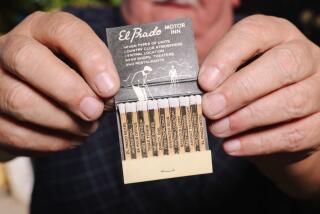The Grandmother’s Club by Alan Cheuse (Gibbs M. Smith: $18.95; 352 pp.)
- Share via
“In an accident, you only die once, but in a family, you go on living.” “The Grandmother’s Club” presents the tangled lives and deaths of a New Jersey Jewish family as seen by the fading eyes but painfully acute memory of the grandmother. Alan Cheuse’s novel is filled with wonderful moments marred by fussy writing that depletes the energy of vision.
Cheuse’s narrator, Minnie Bloch, has much to remember. Her husband, Jacob, was run down by a milk wagon before her only son Manny’s eyes. Maby, Manny the Rabbi’s wife, is losing it. She is caught shoplifting:
“I will not stand for this, she said. Do you know who I am?
“The little policeman stopped trying to pack the groceries and in that voice policeman can put on, or maybe it comes natural, says,
“All right, lady, who are you?
“He might have said another time, I don’t care who you are, and just taken her in. But maybe she piqued his curiosity, so he said, All right, who?
“She was clutching the bag of onions, and her face turned pale, and her eyes, those greenish-gray eyes, turned watery, and she said,
“I don’t know. I don’t really know.
“All right lady, the cop said, we’ll help you get these things out of your car.”
Manny the Rabbi, in temple, begins seeing birds. Then he meets his mistress-to-be: “It’s not always in our power, he said.
“She blows him a little kiss. Save your wisdom for the people upstairs, she says, save your kisses for me.
“And she dashes up the hall toward the stairs.
“Picture now the Rabbi and what do you see? He’s as helpless as a little boy who’s just gotten his first kiss and the little girl has run off into the park, and the glow of it is spreading, spreading across his face, down his neck, his chest, down below, and he’s glowing all over and amazed, amazed, that anything could ever make him feel such a way.”
Sarah, Manny’s daughter, moves relentlessly from princess under parental pressure to rebellious slut, trading her own broken spirit for her father’s broken heart. Manny finds comfort in the board room of his brother-in-law Mordecai’s business and in the arms of mistress Florette, whose view of social manners was formed by the concentration camp.
Like Faulkner’s Dilsey, only Minnie, the grandmother, endures to record for her friends at the deli “the way a life breaks. The way life goes. The pieces. The pattern. . . .”
Events have the bizarre hallmark of life, stranger than fiction, underlined by the pathos of a matriarch’s omniscience: “The son hurts, the mother hurts. That is a law of life. But as far as laws go, what happened in the next months, it showed me an answer to the questions he had on his mind about the devil or not the devil. If you could say anything on that question that made sense after what happened next, the answer was there to see. It always has been. It always will be. Life is the devil. “
Cheuse captures the smorgasbord flavors of the East Coast immigrant ghetto as successfully as Philip Roth--without the histrionics--as convincingly as Hubert Selby--without the heart. His use of dialogue is often as vital as Joyce’s or Hemingway’s: “But if one hand held a kite string and was tugging, pulling him forward, the other hand held a scissors and quick like that cut the tie, and my Manny pitches forward off the dais, landing at our feet like the kite crumpling, except there was a thud, a skid and a thud, like a crate of vegetables or fruit that some dockworker with muscles thick as rope drops on the ground.
“What’s all this? Mrs. Pinsker asked. Birds? Kites? Workers? Boxes of fruit? He fell. I was there. I saw. He walked up to the edge of the what-do-you-call it and he tipped over. He wasn’t drunk. He didn’t trip. But I didn’t see no birds either, darling. No birds.”
Life is an endless conversation, until it ends. Then we hope a loving survivor will round it off into significance and meaning. So talk is transformed into art by the artist who is separate from his materials; and Manny’s story as a finished form is experienced by anyone but Manny. His mother gave him birth, his mother’s narrative buries him under the warmth of words. Cheuse’s use of a fluid point of view, moving from son to mother to family as lines of individuality mingle and blur is heavily influenced by Garcia Marquez and Carlos Fuentes.
But “The Grandmothers’ Club” fails in execution because the narrative logic is monotonous. All the characters talk and think in the same punny style, a style that loses its credibility as the consciousness of Minnie the grandmother becomes too obviously the poetic character of Cheuse the literatus. Ambition is defeated by self-consciousness: “Whiskey clips the wings of the bird of time, the bird flies slower, slower all the day, until it finally may not even get off the ground.” The style is eloquent, but eloquent style not contained within fictional bounds counters elegance. Cheuse’s novel is a rare and lovely bird with a broken wing.
More to Read
The biggest entertainment stories
Get our big stories about Hollywood, film, television, music, arts, culture and more right in your inbox as soon as they publish.
You may occasionally receive promotional content from the Los Angeles Times.










